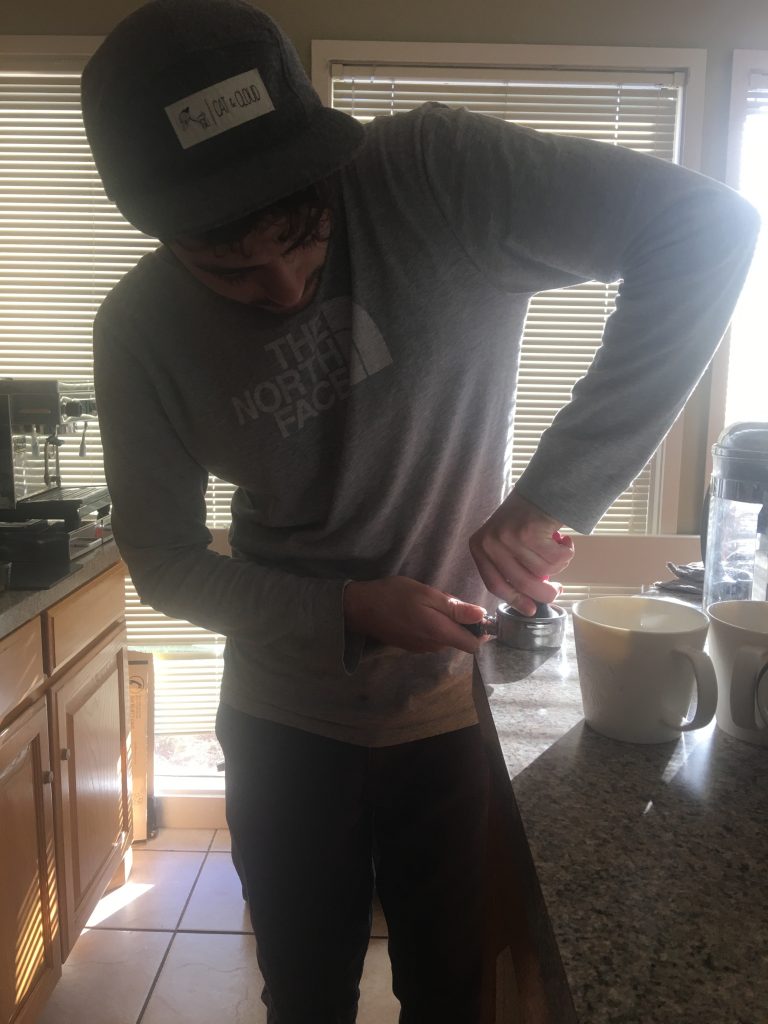Solomon Gerges stares carefully at his portafilter, making sure the coffee grounds are perfectly smooth across making an even bed. He skillfully tamps the coffee on the countertop, applying 30 pounds of pressure and thus preparing it for the wrath of the dragon boiler that will brew it into a shot of espresso.
As the brew rains then streams into the cup, he intently steams almond milk to a froth. When the milk is poured into the espresso, waves are created, resembling a heart atop the surface.
For almost three years, Gerges has been experimenting with coffee brewing. Beginning with a french press, both his skill and passion for the art has increased as time’s gone by. He now owns nearly 20 pieces of of equipment, including multiple french presses, a siphon and pour over coffee maker.
Gerges has set up his equipment in the common area of Smith-Adams Hall, creating a makeshift cafe of sorts. Every Thursday from 4:30 p.m. until 6:30 he can be found stirring coffee and conversation.
“What it looks like for me to create an atmosphere is – to yeah have some music, that’s basic – but to really be in tune with what people need, what people want and putting those two together in a relatively timely manner and in an environment where they feel like they were meant to be in,” said Gerges.
His approach seems to be working. Joshua Sidic, sophomore political science major from Dallas, described the atmosphere as “a more quiet, comfortable setting.” At peak volume times, anywhere from 15 to 20 people can be found drinking his coffees.
Along with Sidic, Daniel Garcia, sophomore English education major from San Antonio, is a frequent patron of Gerges and says he enjoys the coffee as well as the conversation. Because they live in Smith-Adams, they know they people who come to hang out and can engage in more lively and familiar conversation as opposed to another cafe.
One thing that Gerges strongly emphasized is how coffee is currency for conversation.
Gerges started brewing for others on campus last semester, picking it back up the second week back this term.
He can make a variety of hot drinks for people, using quality ingredients such as Vietnamese cinnamon and mesquite honey to make Americanos, lattes with alternative milks, flat whites, cappuccinos, tea lattes and pour overs. He hopes to include siphoned coffees starting in March.
“I seek to enjoy a quality coffee, because I think if you’re serving quality that expresses something about you, and if you’re not serving quality, what are you doing?” said Gerges.
Instead of an outright business, Gerges has a tip jar if his consumers choose to “pay” for their beverage. He currently makes about 50% of his expenditure back, and it only costs him between $25 and $30 per week to run his operation.
Gerges has ventured cross-country and along the way found tidbits he incorporates into his work.
“Over break, after running a marathon, I went to Dallas, Austin, San Marcos then to San Antonio, Ruidoso (New Mexico) and Salt Lake City (Utah) and learned about coffee, and I learned what we’re missing in Abilene, specifically.” He has visited every major city in Texas and many others nationwide, including Seattle.
“I think the greatest thing I learned is that in different ways, people are pushing the boundaries of coffee where they are, but people aren’t doing that in Abilene yet,” said Gerges. “I love coffee, and I want coffee in Abilene to get better.”
He sees a coffee shop as the ultimate cultural example of optimum hospitality and wants to improve on what the Abilene coffee community is lacking.
Gerges started working for The Abilene Post and has written 13 coffee-related articles to date. These articles include a review of nearly every coffee shop in Abilene, as well as columns on coffee theory and coffee design.
Gerges stresses how coffee shops could improve. Essentially, it boils down to a necessity for better research into ingredient quality. According to Gerges, coffee shops’ roasters and brewers could be better. He also believes that local coffee shops should take a closer look at water and milk quality.
“It’s hard for me to support shops when quality isn’t as important as it should be to them,” said Gerges.
When gauging the quality of a cafe, he encourages consumers to look at who the shop’s roaster is – inspecting the coffee they serve there, what the shop communicates with its walls – art, branding, etc., as well as interacting with the barista and seeing what they know. Their knowledge conveys the underlying message of cafe, according to Gerges.
“The measure of a shop is how clean they keep it, on top of that look at their customer service. If their customer service isn’t good, they are sending a mixed message,” Gerges said. He stressed that everyone on staff needs to be good with customer service. This can be achieved with as simple of a gesture as a smile, and greatly improved by baristas delivering orders to tables when the customer volume is low.
In the short term, Gerges wants to continue to grow coffee community locally and is working on creating a coffee competition between the baristas of the community.
Eventually, he wants to own his own shop, ideally privately funded, where he can convey community in a space with inexpensive materials. Gerges described this ideal atmosphere as being where people can feel free to create, to study and to truly commune with other people, something he is currently striving for with his coffee endeavors.

